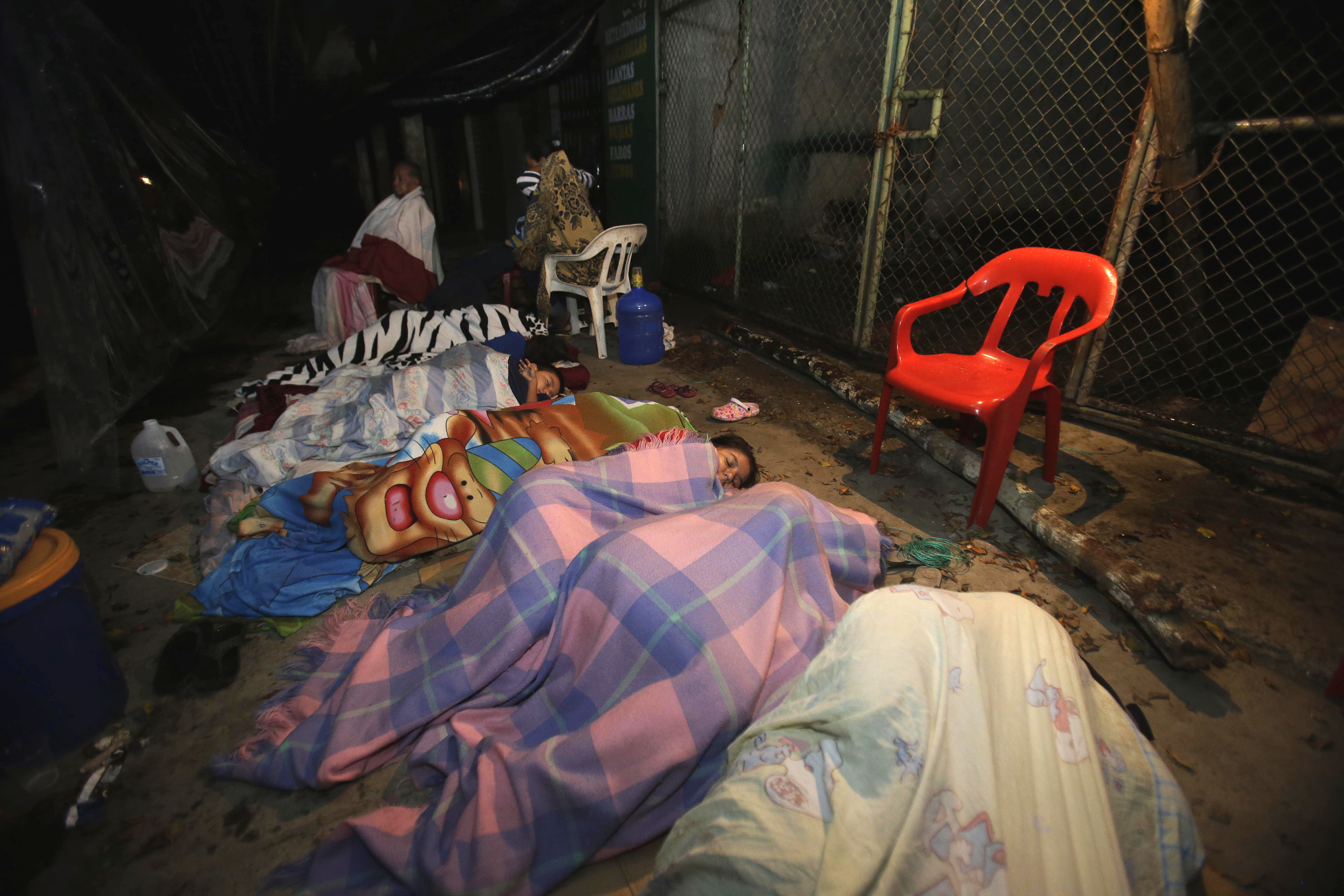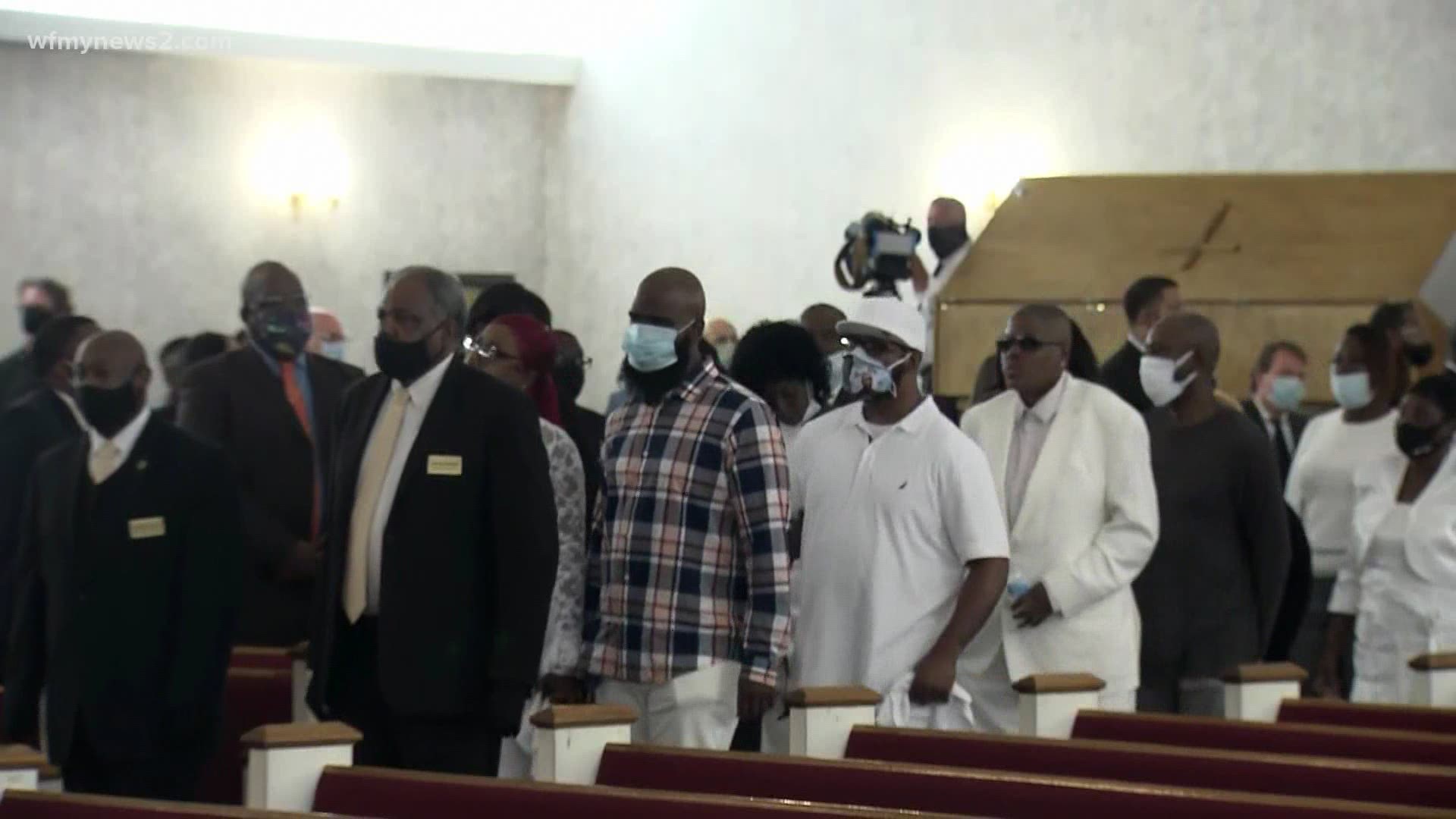The most deadly earthquake to hit Ecuador in nearly two decades has left at least 246 dead, and leaders of the Andean nation cautioned on Sunday that the death toll could still rise.
The magnitude-7.8 earthquake, which also injured more than 2,500, struck Saturday night, toppling buildings, damaging roads and impacting cities hundreds of miles away from its epicenter near the small fishing village of Muisne. More than 135 aftershocks have been felt, according to Ecuador’s seismological institute.
President Rafael Correa, who was traveling abroad on official business, declared a national emergency and urged Ecuadoreans to stay strong.
“Everything can be rebuilt, but what can’t be rebuilt are human lives, and that’s the most painful,” he said in a phone call to state TV before departing Rome straight for the coastal Ecuador city of Manta.
![Timing of massive quakes around globe coincidence [oembed : 83157898] [oembed : 83157898] [oembed : 83157898] [oembed : 83157898] [oembed : 83157898] [oembed : 83157898] [oembed : 83157898] [oembed : 83157898] [oembed : 83157898] [oembed : 83157898] [oembed : 83157898] [oembed : 83157898] [oembed : 83157898] [oembed : 83157898] [oembed : 83157898] [oembed : 83157898] [oembed : 83157898] [oembed : 83157898] [oembed : 83157898] [oembed : 83157898] [oembed : 83157898] [oembed : 83157898]](/Portals/_default/Skins/PrestoLegacy/CommonCss/images/smartembed.png)
The Ecuador quake comes after two powerful earthquakes hit Japan last week, killing at least 41 people with 11 others still missing Sunday.
Landslides in Ecuador complicated emergency workers efforts to reach some areas hardest hit. Many survivors were trapped beneath the rubble of collapsed buildings, as rescue workers try to pull them out.
"These are very difficult moments," said Vice President Jorge Glas, who had taken charge of recovery efforts until Correa returned from a Vatican conference. "We have information that there are injured people who are trapped (under rubble) in different districts and we are getting ready to rescue them."
The quake caused damage as far away as 300 miles south of the epicenter. In the port city of Guayaquil, an overpass collapsed on a car, killing the driver and seriously injuring the passenger, Colombian broadcaster Noticias Caracol reported. Several other buildings were damaged, and the roof of a shopping center in Guayaquil collapsed.
Correa on Twitter described Pedernales, a city of about 40,000 near the epicenter, as "destroyed."
After the tremblor, residents slept in the streets while men using car headlights tried to rescue survivors who could be heard trapped under the rubble, the Associated Press reported.
"We’re trying to do the most we can, but there’s almost nothing we can do,” said Pedernales Mayor Gabriel Alcivar.
The government has deployed 10,000 armed forces plus an additional 3,500 national police officers to the regions that were hit.
Glas, in a televised address, said the death toll would likely rise.
"No Ecuadorian is alone," he said in a message on Twitter. "We are a strong ... nation that is united and will emerge stronger from this disaster."
![Ningún ecuatoriano está solo. Somos una nación fuerte, solidaria, que está unida [oembed : 83152574] [oembed : 83152574] [oembed : 83152574] [oembed : 83152574] [oembed : 83152574] [oembed : 83152574] [oembed : 83152574] [oembed : 83152574] [oembed : 83152574] [oembed : 83152574] [oembed : 83152574] [oembed : 83152574] [oembed : 83152574] [oembed : 83152574] [oembed : 83152574] [oembed : 83152574] [oembed : 83152574] [oembed : 83152574] [oembed : 83152574] [oembed : 83152574] [oembed : 83152574] [oembed : 83152574] [oembed : 83152574] [oembed : 83152574] [oembed : 83152574] [oembed : 83152574] [oembed : 83152574] [oembed : 83152574] [oembed : 83152574] [oembed : 83152574] [oembed : 83152574] [oembed : 83152574] [oembed : 83152574] [oembed : 83152574] [oembed : 83152574] [oembed : 83152574] [oembed : 83152574] [oembed : 83152574] [oembed : 83152574] [oembed : 83152574] [oembed : 83152574] [oembed : 83152574] [oembed : 83152574] [oembed : 83152574] [oembed : 83152574] [oembed : 83152574] [oembed : 83152574] [oembed : 83152574] [oembed : 83152574] [oembed : 83152574] [oembed : 83152574] [oembed : 83152574] [oembed : 83152574] [oembed : 83152574] [oembed : 83152574] [oembed : 83152574] [oembed : 83152574] [oembed : 83152574] [oembed : 83152574] [oembed : 83152574] [oembed : 83152574] [oembed : 83152574] [oembed : 83152574] [oembed : 83152574] [oembed : 83152574] [oembed : 83152574] [oembed : 83152574] [oembed : 83152574] [oembed : 83152574] [oembed : 83152574]](/Portals/_default/Skins/PrestoLegacy/CommonCss/images/smartembed.png)
![Instituciones de respuesta ayudan a ciudadanos que acuden al @ECU911PVO | #Sismo [oembed : 83152576] [oembed : 83152576] [oembed : 83152576] [oembed : 83152576] [oembed : 83152576] [oembed : 83152576] [oembed : 83152576] [oembed : 83152576] [oembed : 83152576] [oembed : 83152576] [oembed : 83152576] [oembed : 83152576] [oembed : 83152576] [oembed : 83152576] [oembed : 83152576] [oembed : 83152576] [oembed : 83152576] [oembed : 83152576] [oembed : 83152576] [oembed : 83152576] [oembed : 83152576] [oembed : 83152576] [oembed : 83152576] [oembed : 83152576] [oembed : 83152576] [oembed : 83152576] [oembed : 83152576] [oembed : 83152576] [oembed : 83152576] [oembed : 83152576] [oembed : 83152576] [oembed : 83152576] [oembed : 83152576] [oembed : 83152576] [oembed : 83152576] [oembed : 83152576] [oembed : 83152576] [oembed : 83152576] [oembed : 83152576] [oembed : 83152576] [oembed : 83152576] [oembed : 83152576] [oembed : 83152576] [oembed : 83152576] [oembed : 83152576] [oembed : 83152576] [oembed : 83152576] [oembed : 83152576] [oembed : 83152576] [oembed : 83152576] [oembed : 83152576] [oembed : 83152576] [oembed : 83152576] [oembed : 83152576] [oembed : 83152576] [oembed : 83152576] [oembed : 83152576] [oembed : 83152576] [oembed : 83152576] [oembed : 83152576] [oembed : 83152576] [oembed : 83152576] [oembed : 83152576] [oembed : 83152576] [oembed : 83152576] [oembed : 83152576] [oembed : 83152576] [oembed : 83152576] [oembed : 83152576] [oembed : 83152576]](/Portals/_default/Skins/PrestoLegacy/CommonCss/images/smartembed.png)
Pope Francis, addressing the faithful in St. Peter’s Square on Sunday, asked them to pray for those suffering in the aftermath of the Ecuador and Japan earthquakes. "May the help of God and of neighbors give them strength and support,” he said.
The National Polytechnic Institute's Geological Institute said the Ecuador earthquake is poised to become the strongest in that country since 1979, when a magnitude-8.0 quake occurred near Tumaco, Colombia, and triggered a tsunami. It's the deadliest quake to effect Ecuador since a magnitude-7.2 quake in March 1987 left about 1,000 dead, according to the U.S. Geological Survey.
Since 1900, there have been seven magnitude-7.0 quakes within 155 miles of the epicenter of Saturday's massive earthquake, according to the geological survey.
Saturday's earthquake could also be felt in northern Peru and southern Colombia. No injuries were reported there. A tsunami warning was issued Saturday night for the coasts of Ecuador, Colombia, Costa Rica, Panama and Peru, but that threat has mostly passed, the National Weather Service's Pacific Tsunami Warning Center said.
![5.8-magnitude earthquake hits Tonga in Pacific [oembed : 83152864] [oembed : 83152864] [oembed : 83152864] [oembed : 83152864] [oembed : 83152864] [oembed : 83152864] [oembed : 83152864] [oembed : 83152864] [oembed : 83152864] [oembed : 83152864] [oembed : 83152864] [oembed : 83152864] [oembed : 83152864] [oembed : 83152864] [oembed : 83152864] [oembed : 83152864] [oembed : 83152864] [oembed : 83152864] [oembed : 83152864] [oembed : 83152864] [oembed : 83152864] [oembed : 83152864] [oembed : 83152864] [oembed : 83152864] [oembed : 83152864] [oembed : 83152864] [oembed : 83152864] [oembed : 83152864] [oembed : 83152864] [oembed : 83152864] [oembed : 83152864] [oembed : 83152864] [oembed : 83152864] [oembed : 83152864] [oembed : 83152864] [oembed : 83152864] [oembed : 83152864] [oembed : 83152864] [oembed : 83152864] [oembed : 83152864] [oembed : 83152864] [oembed : 83152864] [oembed : 83152864] [oembed : 83152864] [oembed : 83152864] [oembed : 83152864] [oembed : 83152864] [oembed : 83152864] [oembed : 83152864] [oembed : 83152864] [oembed : 83152864] [oembed : 83152864]](/Portals/_default/Skins/PrestoLegacy/CommonCss/images/smartembed.png)
"There had been some small tremors going on for about two or three months, and I thought it was one of those but after about 20, 30 seconds it started to get really strong," Cristian Ibarra Santillan in Quito told the BBC. "And I grabbed my dog and I hid under the table. But then I realized that it wasn't going away so I just ran with him outside."
David Rothery, a professor of planetary geosciences at The Open University, northeast of London, told the AP that the total energy released by the magnitude-7.8 quake in Ecuador was “probably about 20 times greater” than the magnitude-7.0 quake in Japan early Saturday.
The Ecuador earthquake began deeper underground than the recent Japan quake, which would have lessened the shaking on the ground. But Ecuador is experiencing a greater loss of life and greater damage to property than Japan, because of its less stringent construction codes.
Rothery added that “there is no causal relationship between the earthquakes in Ecuador and Japan,” the AP said.
!['Buried alive': Japan rushes to aid earthquake victims as storm approaches [oembed : 83152866] [oembed : 83152866] [oembed : 83152866] [oembed : 83152866] [oembed : 83152866] [oembed : 83152866] [oembed : 83152866] [oembed : 83152866] [oembed : 83152866] [oembed : 83152866] [oembed : 83152866] [oembed : 83152866] [oembed : 83152866] [oembed : 83152866] [oembed : 83152866] [oembed : 83152866] [oembed : 83152866] [oembed : 83152866] [oembed : 83152866] [oembed : 83152866] [oembed : 83152866] [oembed : 83152866] [oembed : 83152866] [oembed : 83152866] [oembed : 83152866] [oembed : 83152866] [oembed : 83152866] [oembed : 83152866] [oembed : 83152866] [oembed : 83152866] [oembed : 83152866] [oembed : 83152866] [oembed : 83152866] [oembed : 83152866] [oembed : 83152866] [oembed : 83152866] [oembed : 83152866] [oembed : 83152866] [oembed : 83152866] [oembed : 83152866] [oembed : 83152866] [oembed : 83152866] [oembed : 83152866] [oembed : 83152866] [oembed : 83152866] [oembed : 83152866] [oembed : 83152866] [oembed : 83152866] [oembed : 83152866] [oembed : 83152866]](/Portals/_default/Skins/PrestoLegacy/CommonCss/images/smartembed.png)
![Recent Earthquakes in Ecuador [oembed : 83154950] [oembed : 83154950] [oembed : 83154950] [oembed : 83154950] [oembed : 83154950] [oembed : 83154950] [oembed : 83154950] [oembed : 83154950] [oembed : 83154950] [oembed : 83154950] [oembed : 83154950] [oembed : 83154950] [oembed : 83154950] [oembed : 83154950] [oembed : 83154950] [oembed : 83154950] [oembed : 83154950] [oembed : 83154950] [oembed : 83154950] [oembed : 83154950] [oembed : 83154950] [oembed : 83154950] [oembed : 83154950] [oembed : 83154950] [oembed : 83154950] [oembed : 83154950] [oembed : 83154950] [oembed : 83154950] [oembed : 83154950] [oembed : 83154950] [oembed : 83154950] [oembed : 83154950] [oembed : 83154950] [oembed : 83154950]](/Portals/_default/Skins/PrestoLegacy/CommonCss/images/smartembed.png)
![Ecuador Overview [oembed : 83154966] [oembed : 83154966] [oembed : 83154966] [oembed : 83154966] [oembed : 83154966] [oembed : 83154966] [oembed : 83154966] [oembed : 83154966] [oembed : 83154966] [oembed : 83154966] [oembed : 83154966] [oembed : 83154966] [oembed : 83154966] [oembed : 83154966] [oembed : 83154966] [oembed : 83154966] [oembed : 83154966] [oembed : 83154966] [oembed : 83154966] [oembed : 83154966] [oembed : 83154966] [oembed : 83154966] [oembed : 83154966] [oembed : 83154966] [oembed : 83154966] [oembed : 83154966] [oembed : 83154966] [oembed : 83154966] [oembed : 83154966] [oembed : 83154966] [oembed : 83154966] [oembed : 83154966] [oembed : 83154966] [oembed : 83154966]](/Portals/_default/Skins/PrestoLegacy/CommonCss/images/smartembed.png)
![Gannett-cdn [oembed : 83157672] [oembed : 83157672] [oembed : 83157672] [oembed : 83157672] [oembed : 83157672] [oembed : 83157672] [oembed : 83157672] [oembed : 83157672] [oembed : 83157672] [oembed : 83157672] [oembed : 83157672] [oembed : 83157672] [oembed : 83157672] [oembed : 83157672] [oembed : 83157672] [oembed : 83157672] [oembed : 83157672] [oembed : 83157672] [oembed : 83157672] [oembed : 83157672] [oembed : 83157672] [oembed : 83157672] [oembed : 83157672] [oembed : 83157672]](/Portals/_default/Skins/PrestoLegacy/CommonCss/images/smartembed.png)


![635964561197033687-Ecuador-rescue.JPG [image : 83152348]](http://www.gannett-cdn.com/-mm-/e572596843e71b8dbb0ccf7122add7c5f8b67e1a/c=114-0-910-680/local/-/media/2016/04/17/USATODAY/USATODAY/635964561197033687-Ecuador-rescue.JPG)
![7.8 earthquake kills dozens in Ecuador [gallery : 83152220]](http://www.gannett-cdn.com/-mm-/5eb3a77abdda33d9897c9734e44ff6597ad24a83/c=18-0-1007-845/local/-/media/2016/04/17/USATODAY/USATODAY/635964564903305445-Ecuador-rescue2.JPG)
